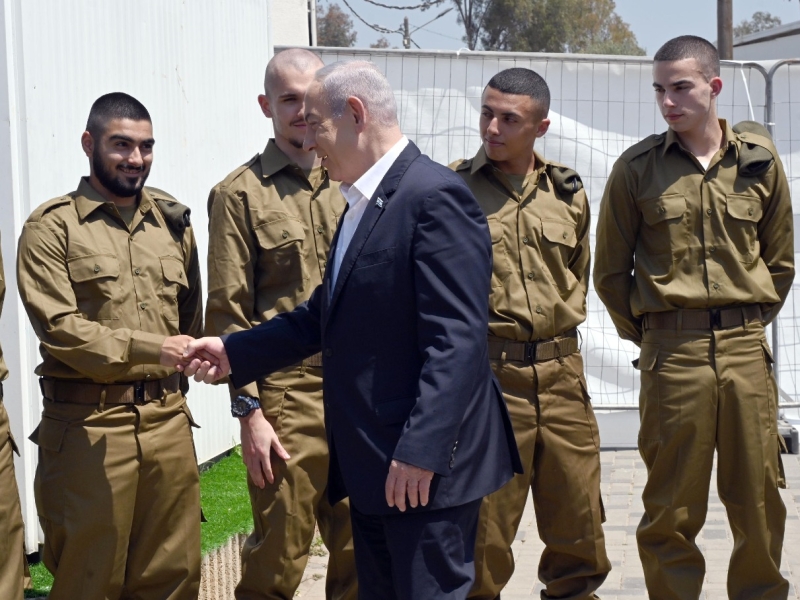
Israel's Prime Minister Benjamin Netanyahu with new IDF recruits today© photo by Haim Zach, Government Press Office, Israel
Tel Aviv/Moscow/Tehran/Washington/Beijing: Two days after Iran’s attack with missiles and drones, Israel’s Prime Minister Benjamin Netanyahu, today named Iran behind Hamas, Hezbollah and “others” as part of a “greater campaign”, and declared that “we are determined to win there, and to defend ourselves in all sectors”.
Netanyahu today met with the Israeli Defence Forces (IDF) recruits at the IDF induction centre at Tel Hashomer. The recruits were slated for Golani Brigade and Givati Brigade combat positions. Netanyahu firmly stated: “There are three objectives: One – to eliminate Hamas. Two – to return the hostages. And three – to ensure that Hamas never again constitutes a threat to Israel.”
Iranian President Dr Seyyed Ebrahim Raisi Dr Raisi warned Israel: “If any mistake is made, the Zionists and their supporters will find out the real meaning and broad response of Iran.”
Coming to Israel’s aid, the United States of America declared that it had “made clear privately and publicly” that it is committed to Israel’s defence. “That will always be true. That commitment remains ironclad. It will not change. And if there are further attacks on Israel, of course, we will continue to defend them,” the US State Department Spokesperson Matthew Miller said in Washington.
Amidst growing tension in the region after Iran’s attack and an increasing possibility of an Israeli counter-attack, the US, the most formidable ally of Israel, went on to claim that Iran’s attack “violated the sovereignty of several states in the region”.
The Americans have spilt the beans on the possibility of an Israeli counter-attack. It is significant to note that on the evening of April 15, 2024, the US House of Representatives Majority Leader Steve Scalise (Republican), called Prime Minister Benjamin Netanyahu and expressed support for any decision that Israel made in light of the Iranian attack.
According to Prime Minister Netanyahu’s office, the Israeli Prime Minister thanked Majority Leader Scalise for his “warm support”, and made it clear that “Israel would do everything necessary to defend itself”. Scalise informed the Prime Minister of his initiative to advance in Congress, in the coming days, a series of measures against Iran and for Israel. Prime Minister Netanyahu thanked him.
At a press conference in Washington, when asked what the most recent steer the US was getting from Israel on what kind of further retaliation they’re going to — Miller interrupted the journalist and said, “I’m just not going to speak to our private diplomatic conversations”.
Also read:
- Iran at UNSC: ‘We will respond proportionately if US attacks us’
- Iran attacks Israel, threatens more ‘heavier and regrettable response’
Iran went ahead to earn the support of its powerful allies Russia and China today. Dr Raisi today had a telephone conversation with Russian President Vladimir Putin, while his Foreign Minister Hossein Amir-Abdollahian talked to a member of the Political Bureau of the Communist Party of China Central Committee and Foreign Minister Wang Yi, to establish an understanding about Iran’s position with the leaderships of its two friendly nations.
Putin along with Dr Raisi, stated that the unresolved Palestinian-Israeli conflict was the root cause of the current developments in the Middle East. Wang Yi appreciated Iran’s emphasis on not targeting regional countries and neighbouring countries and the reaffirmation of its continued pursuit of good-neighbourly and friendly policies.
While Putin hoped that all sides would exercise sensible restraint and not allow a new round of confrontation that may be fraught with disastrous consequences for the entire region, Wang Yi said China believed that Iran can grasp the situation well and avoid further instability while safeguarding its sovereignty and dignity.
Presenting its case before the two leaders separately, Iran claimed its actions had been forced and limited, and emphasised that Tehran is not interested in further escalation of tensions. Wang Yi said China had noted Iran’s statement that the actions it took were limited and it was an exercise of the right of self-defence in response to the attack on Iran’s embassy building in Damascus, Syria, on April 1, 2024. Both Putin and Dr Raisi too discussed “in detail the situation in the Middle East, escalated by Israel’s air strike at the Iranian diplomatic mission in Damascus and Iran’s retaliation measures”.
Abdullahiyan introduced Iran’s position on the attack on the Iranian embassy in Syria, telling Wang Yi that the United Nations Security Council did not make the necessary response and Iran had the right to respond in self-defence to the violation of its sovereignty. Wang Yi said that the current situation is the spillover effect of the escalation of the conflict in Gaza. Wang Yi said the current regional situation was very sensitive, and Iran was willing to exercise restraint and had no intention of further escalating the situation.
However, over the past two days following the attack, the President of the United States Joe Biden, and the US Secretary of State, Antony J. Blinken have consulted extensively with partners in the region and around the world. Blinken spoke yesterday with the foreign ministers from Egypt, Jordan, Saudi Arabia, Türkiye, Germany, and the United Kingdom, and he continued to make calls with foreign counterparts today.
The US has been consulting with partners on any further actions to hold Iran accountable for its behaviour. As it is, the US has put more than 500 sanctions in place on Iran and Iranian entities.
“We will continue to emphasize the importance that the international community act as a united front in condemning [Iran’s] such reckless escalatory acts. Such behaviour threatens to destabilize the region and endangers all its people, and Iran’s attack violated the sovereignty of several states in the region,” US State Department Spokesperson Miller said. He made it “absolutely clear” that America’s commitment to Israel’s security “is sacrosanct”. He added: “Our contributions to Israel’s defence against Iran are a clear manifestation of that commitment. So too are our efforts to advance a ceasefire of at least six weeks in Gaza, which would secure the release of all remaining hostages and create a pathway to a more enduring peace. We remain committed to advancing that work and providing lasting peace and security for Israel, for the Palestinian people, and for the broader region, and we will continue to engage regional and international partners urgently on these areas in the coming days.”
The US has been stressing that it does not want further escalation in the region. When asked what made the US think Israel was going to heed its warning that it doesn’t want to see this conflict further escalated, considering that it had taken the US months to convince Israel on several things, like aid to Gaza, and how they’re conducting their military operation in Gaza, what Miller could offer was that “Israel is a sovereign country. They have to make their own decisions about how best to defend themselves”.
According to him, what the US always tries to do is provide its “best advice as a long-time friend of Israel and a long-time ally and partner” of Israel. “…there have been times over the past six months since October 7th that Israel has taken actions with which we don’t agree, or Israel hasn’t moved as quickly as we would like to implement certain changes. And we engage with them on those issues, and we try to get improvements, and we will continue to try and do that. But at a fundamental level, there is a bond between the United States and the people of Israel, and that bond rests on our shared security. And one of the things that we will continue to be committed to is the defence of that security,” he said.
Miller went on to declare: “And so what we demonstrated over the weekend is that our commitment to Israel’s defence is clear, and it is ironclad, and we back that up not just with words but with action. And we will continue to make that clear, while at the same time ensuring that everyone knows that we are committed to de-escalation in the region, and that’s the policy we’re trying to pursue.”
When asked whether the US expected Israel to share with Washington before it retaliates, Miller repeated cryptically, “I’m just not going to get into those private conversations between our two countries”. He added, “We are in close contact with Israel at a number of different levels – at the White House, between this building and Israeli counterparts, as well as with the Pentagon. But as to the substance of those conversations, I think I’ll keep them private”.





